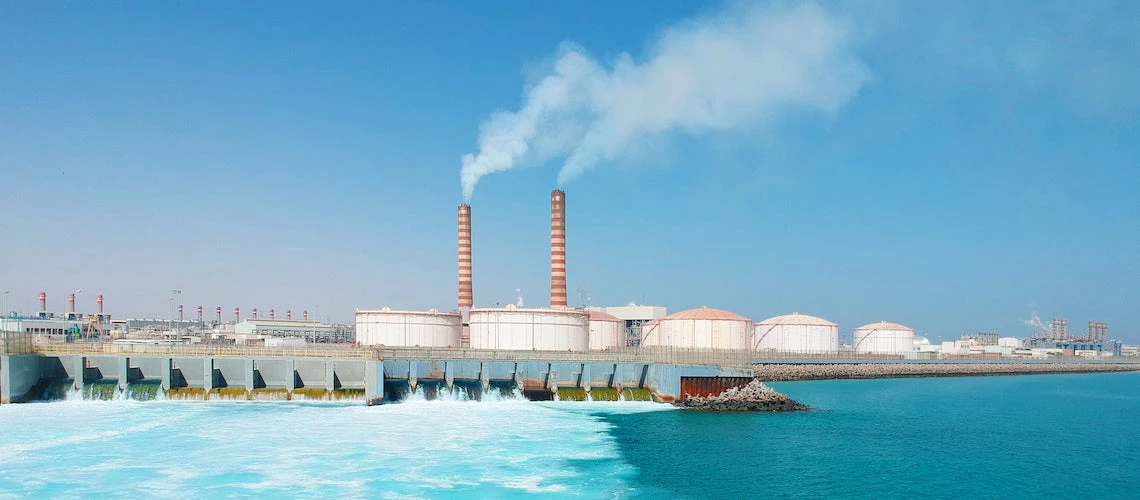 Aerial View of Zour Thermal Power Plant in Kuwait.
Aerial View of Zour Thermal Power Plant in Kuwait.
Water has always been a source of risks and opportunities in the Middle East and North Africa (MENA) and perhaps even more so for the Gulf Cooperation Council (GCC) countries. For millennia, investments and innovations in water management have contributed to social and economic development and to extraordinary accomplishments across a range of sectors, including trade and agriculture. However, long-term sustainability requires new approaches. Currently, water and energy subsidies deepen each sector’s dependence on oil revenues. In a region that is only growing hotter and dryer, securing water and energy for nearly 60 million people grows more expensive every day.
Negative effects on the environment are often the consequences of the management of the water and energy sectors. The Gulf and Red Sea are naturally saltier than the world’s oceans on average, due to elevated evaporation rates and reduced freshwater inflows. Already hundreds of desalination plants deposit hypersaline waste in shallow coastal zones, and many GCC countries have plans for significant expansion of desalination.
New desalination plant effluent triggers a vicious cycle of unsustainability: The higher the salt concentration in waste emptied near source intakes, the more energy required to remove that salt when new seawater is taken in for desalination. Poor or nonexistent brine abatement is degrading coastal marine life and will eventually impact the prospects for coastal tourism.
Left unchecked, by 2050 this effluent will erode species’ integrity and diversity, hurting fisheries, tourism, and coastal communities. Current policies do not adequately respond to these challenges. The strong reliance on cheap energy for the provision of water security will, in the long run, be unsustainable. Reform efforts should be targeted on finding a proactive and coordinated approach that can lead to a green, inclusive, and more resilient low-carbon economy.
Our new World Bank report, “Advancing Knowledge of the Water-Energy Nexus in the GCC Countries,” discusses the challenges GCC countries face in ensuring long-term sustainability of the use of its precious water and energy resources. Prepared in partnership with water and energy experts, the report also highlights the opportunities to improve the situation going forward, drawing on some key innovations in management of the region’s energy and water supply systems.
Moving forward on this critical agenda will require action on several levels:
- transition to greater reliance on renewable sources of energy for desalination of sea water,
- scale the use of renewables to decrease GHG emissions,
- introduce measures to replenish marine habitats,
- invest in research to drive innovation in water management,
- move towards policies and tariffs to encourage more efficient water use, and
- leverage wastewater as a valuable asset for improving water security
The stakes are high. There are many potential policy pathways for GCC countries to consider as they move to more “green” management of water and energy.
Climate change should be used an opportunity to build resilience through the water-energy nexus. Climate risks are real and worsening. Rising heat, falling precipitation, high evaporation, increased demand, and protracted drought all threaten to further stress water resources. Countries need to increase efforts to mitigate and adapt to climate change.
The desalination process requires enormous amounts of energy (overwhelmingly fossil fuels at present). Promoting more efficient production would simultaneously save water for future needs and lowers greenhouse gas emissions.
But the fastest, simplest, cleanest, and most affordable way to double water or energy capacity is to decrease consumption. Countries can increase resource supplies by lowering demand. In the long term, the GCC can increase availability and have significant water and energy savings from increased metering, adequate pricing, and reallocating groundwater on farms.
Another policy that can be taken is restructuring tariffs to match equity with incentives. Despite the scarcity of water, GCC countries charge among the lowest rates for water supply and energy services, resulting in one of the highest per capita water and energy usage rates in the world. Subsidies that try to ensure “lifeline” resource access to the truly needy are instead captured by affluent families. Oman, however, has a good example model of how to ensure fair yet efficient consumption. It combines targeted subsidies for low-income households with tiered rates that raise prices per unit of demand.
GCC countries should rethink of wastewater not as a problem but as valuable resource. The failure to treat wastewater pollutes land and marine ecosystems. Recycling it, however, offers an indispensable and affordable, green way to augment and diversify water and energy supplies. Other regional experiences suggest the GCC region could recapture up to 90% of wastewater for agricultural, industrial, and domestic use.
To transition toward a low-carbon economy, GCC countries can speed the adoption of renewables. Decoupling water production from fossil fuel consumption is key. Saudi Arabia is already working on this goal, embarking on the world’s largest solar desalination plant. Doing so reserves hydrocarbon fuels for export, reduce the cost of energy needed, eases price risks, meets targets, and cuts greenhouse gas emissions.



Join the Conversation